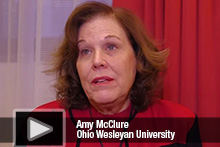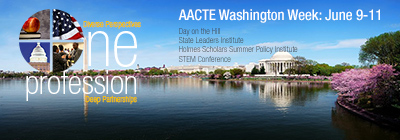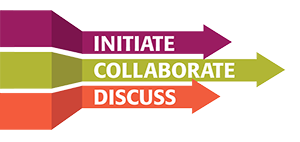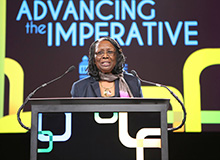20 Apr2015
By AACTE
AACTE applauds the leadership of U.S. Senate HELP Committee Chairman Lamar Alexander (R-TN) and Ranking Member Patty Murray (D-WA) on the unanimous, bipartisan passage of the Every Child Achieves Act of 2015 (ECA). AACTE is pleased with the committee’s progress on the long overdue reauthorization of the Elementary and Secondary Education Act (ESEA).
The bill moves away from the "test and punish" strategy that evolved from the implementation of the current version of ESEA, known as the No Child Left Behind Act of 2001. While the bill retains the requirement for annual assessments disaggregated by subgroups, it leaves states, schools, teachers, and parents to determine what to do about the results of those assessments. AACTE believes students would benefit from stronger accountability for subgroup results, but overall, the bill makes important bipartisan progress toward fixing a broken law.
20 Apr2015
By Jerrica Thurman

Do you think educator preparation programs are out of touch with today’s PK-12 schools? See what Ohio’s teacher educators are doing to engage with their partners in this video for AACTE’s Debunking Myths campaign. See how you can participate in the campaign here.
In early March, 60 representatives from Ohio public and private higher education institutions converged for Day on the Square to meet with state legislators, including Senate Education Committee Chair Peggy Lehner and House Education Committee Chair Bill Hayes. Conversations centered on current policies, legislation, and the direction of teacher education in Ohio, focused specifically on the theme “Merging Voice and Vision Through P-16 Partnerships.”
20 Apr2015
By Matthew Wales
Last year, AACTE received 560 session proposals for its Annual Meeting in Atlanta. Given the limited number of spaces available for presentations, only 50% of proposals were accepted.
Looking to present at AACTE’s 2016 Annual Meeting in Las Vegas? Want to make your proposal stand out from other proposals received? Here are five tips to help your proposal rise to the top.
17 Apr2015
By Gloriatine Jones

Have you seen the April/May 2015 issue of Educational Horizons from Pi Lambda Theta? It’s a humorous one that makes light of some imagined—and real—classroom challenges.
Thanks to a partnership with Phi Delta Kappa and Pi Lambda Theta, all AACTE members receive free online access to this magazine for future teachers as a benefit of their AACTE membership. Chief Representatives also receive each issue by mail.
16 Apr2015
By Nancy Zimpher
Editor’s Note: Former AACTE Board member and education dean Nancy Zimpher reminds readers of the important purpose of standardized testing, which has been overshadowed by recent political battles and opt-out campaigns. This essay originally appeared on the State University of New York’s Big Ideas blog and is reposted with permission. The opinions expressed in this essay do not necessarily reflect the position of AACTE.
When it comes to whether students should opt out of standardized testing, no one is actually talking about what’s best for our kids. Standardized tests have become a pawn in political debates about teacher evaluations and we have lost sight of what they are: a way to measure what students know so we can help them improve.
15 Apr2015
By Etta R. Hollins and Rodrick Lucero
The following letter to the editor was published today in Education Week.
There are kids entering urban classrooms every day hungry, sad, tired, and angry. Name an obstacle to learning, and most urban teachers have seen it play out firsthand among their students.
In January, the Horace Mann League of the United States released School Performance in Context: The Iceberg Effect, a report on the “unparalleled levels” of poverty, inequity, and violence faced by U.S. students. Though outside factors such as these are not the reason for increasing gaps in achievement, they’re barriers teachers must understand and address to have an impact on student learning.
14 Apr2015
By Rodrick Lucero

Join your voice with those of other educator preparation providers at AACTE’s annual Washington Week, to be held in the nation’s capital June 9-11. Under the unifying theme “Diverse Perspectives, Deep Partnerships, One Profession,” this year’s Washington Week will be held at the Washington Marriott Wardman Park Hotel. This is your chance to deliberate with colleagues on provocative issues in the profession, experience interactive sessions with national leaders, and convene with policy officials.
14 Apr2015
By Mark Ginsberg and Renée A. Middleton
AACTE has long supported the role of accreditation in the field and continues to uphold the Council for the Accreditation of Educator Preparation (CAEP) as the profession’s single accreditor. This commitment was reaffirmed by the AACTE Board of Directors at its meeting February 26, 2015. Along with offering this affirmation of support, the resolution passed by the Board also sought to open a conversation with CAEP around persistent concerns raised by the field with respect to CAEP’s standards, process, capacity, and representativeness in its governance structure.
13 Apr2015
By Kristin McCabe
Are you thinking of applying for a federal “First in the World” (FITW) grant? Learn about the program during a free webinar with the U.S. Department of Education this Wednesday, April 15, 4:00-5:00 p.m. EDT.
The FITW program is run through the Department’s Fund for the Improvement of Postsecondary Education office. Intended to spur collaborative innovation among institutions of higher education and partnering nonprofit organizations, FITW grants target improved educational outcomes, college affordability, and an evidence base of effective practices. The grants are funded at $60 million this year, including a $16 million set-aside for minority-serving institutions.
13 Apr2015
By Tracy Spesia
Editor’s Note: Tracy Spesia, a nationally trained edTPA scorer, is the recent recipient of an innovation award from the University of Saint Francis for her work on edTPA at the College of Education. According to the university, Spesia’s “creative and successful efforts with the implementation of edTPA have positioned USF as a leader in the state” and have helped enhance “the quality of USF students’ application of theory into practice during their field experiences.” In recognition of her leadership, she was appointed to the Illinois Association for Teacher Education in Private Colleges as the edTPA liaison. Spesia also serves on the executive board of the Illinois Association of Colleges for Teacher Education. Click here for information about becoming an edTPA scorer.
This year I became an official edTPA scorer, and it is one of the most rewarding professional experiences I have had since I started working in the area of teacher preparation.
10 Apr2015
By Kim Murray

Did you know that AACTE has 14 topical action groups (TAGs) established to date? TAGs are member-initiated working groups that are supported by AACTE. Anyone from a member institution can join existing TAGs, or start their own TAG, at any time.
TAGs address topics as diverse as accreditation, diverse workforce development, research in teacher preparation, and women in the deanship, among others. (For a complete list of TAGs, visit our web site).
07 Apr2015
By Deborah Koolbeck
Today, Chairman Lamar Alexander (R-TN) and Ranking Member Patty Murray (D-WA) of the Senate Committee on Health, Education, Labor, and Pensions (HELP) released a bipartisan bill on the reauthorization of the Elementary and Secondary Education Act (ESEA). A summary of the bill, dubbed the Every Child Achieves Act, can be found here. The full bill can be found here.
07 Apr2015
By Jerrica Thurman
Kick off the summer with AACTE’s signature June events: Washington Week and the Leadership Academy. Join your colleagues from around the country in Washington, DC, advocating for the profession on Capitol Hill and participating in a special conference on closing the achievement gap in science, technology, engineering, and mathematics (STEM) fields; or meet with fellow new deans and administrators in Cincinnati, Ohio, for intensive leadership development and networking. These are two popular summer conferences, so mark your calendar today!
07 Apr2015
By Etta R. Hollins

Editor’s Note: Professor Hollins inspired attendees of AACTE’s recent Annual Meeting in Atlanta during the Speaker Spotlight Session. (View a video recording of her speech here, and read another version in this Hechinger Report piece, which includes the video she played during her address.) To follow up on her presentation, we invited Hollins to explore her topic in a series of blogs for Ed Prep Matters. This is the final post in the series.
Most teachers in urban schools, as elsewhere, are dedicated professionals who put much effort into their practice and care deeply about the students they teach. Teachers understandably feel frustrated when their students fail to meet expectations for learning outcomes. How they address this frustration, however, makes all the difference for student outcomes—and it is influenced heavily by the ideology developed in their school’s professional community.
06 Apr2015
By Sharon Robinson
News Flash! The interest of students and their opportunity to learn is not better or even well served by a strategy of constant and high demand of inexperienced teachers. Retention matters, not just to teachers but, most critically, to students.
Recent studies showing that teacher effectiveness continues to develop over time reinforce this imperative to do right by our students. First, in a working paper completed last year for the National Center for Analysis of Longitudinal Data in Education Research, researchers at Duke University found that middle school teachers’ effect on student test scores as well as attendance rates improves over at least several years. A subsequent study out of Brown University found improvement in teacher effectiveness is indeed steepest in the early years in the classroom but continues for many more years, challenging the common perception that teacher quality is a fixed characteristic after just a couple of years of experience.











